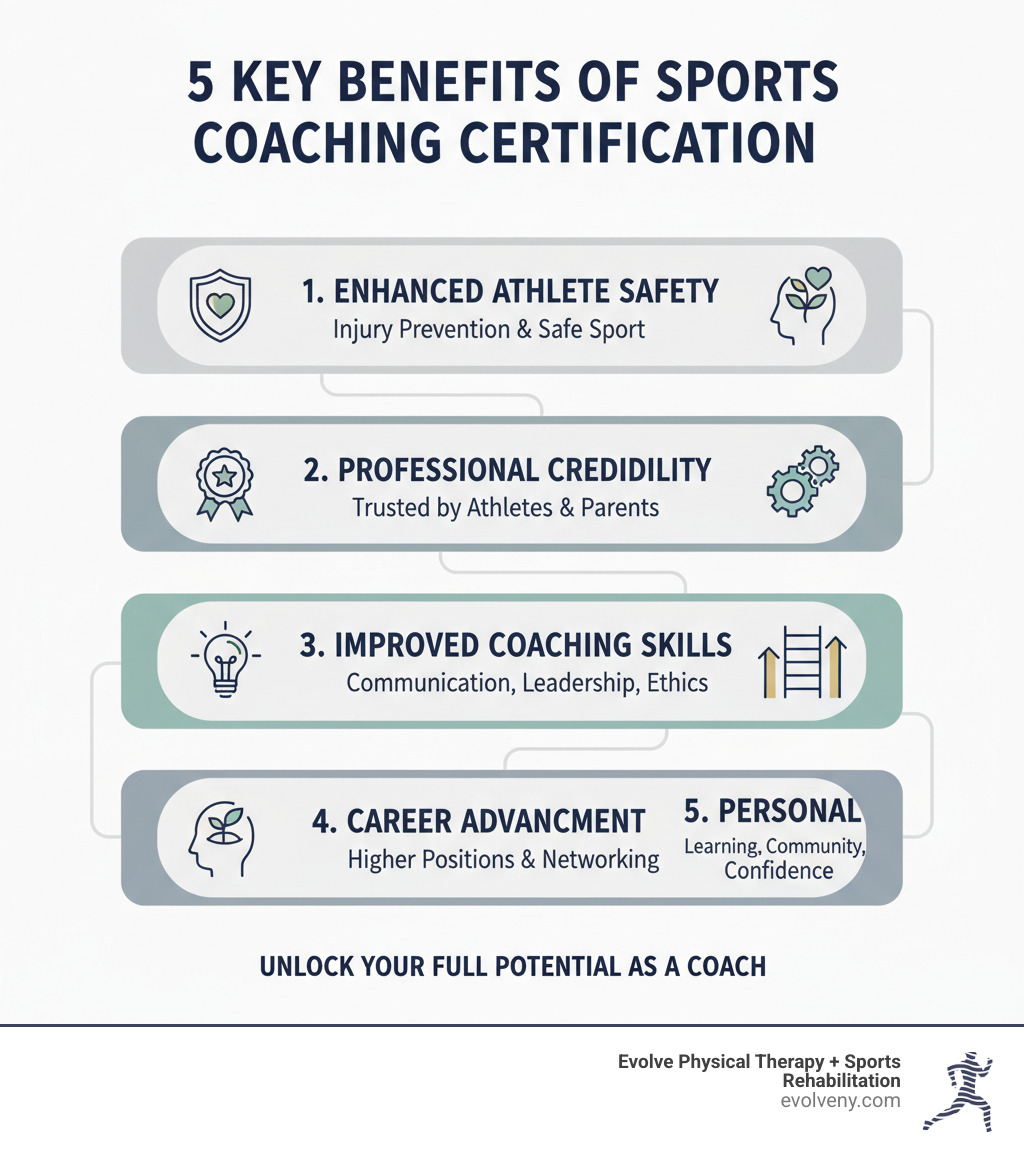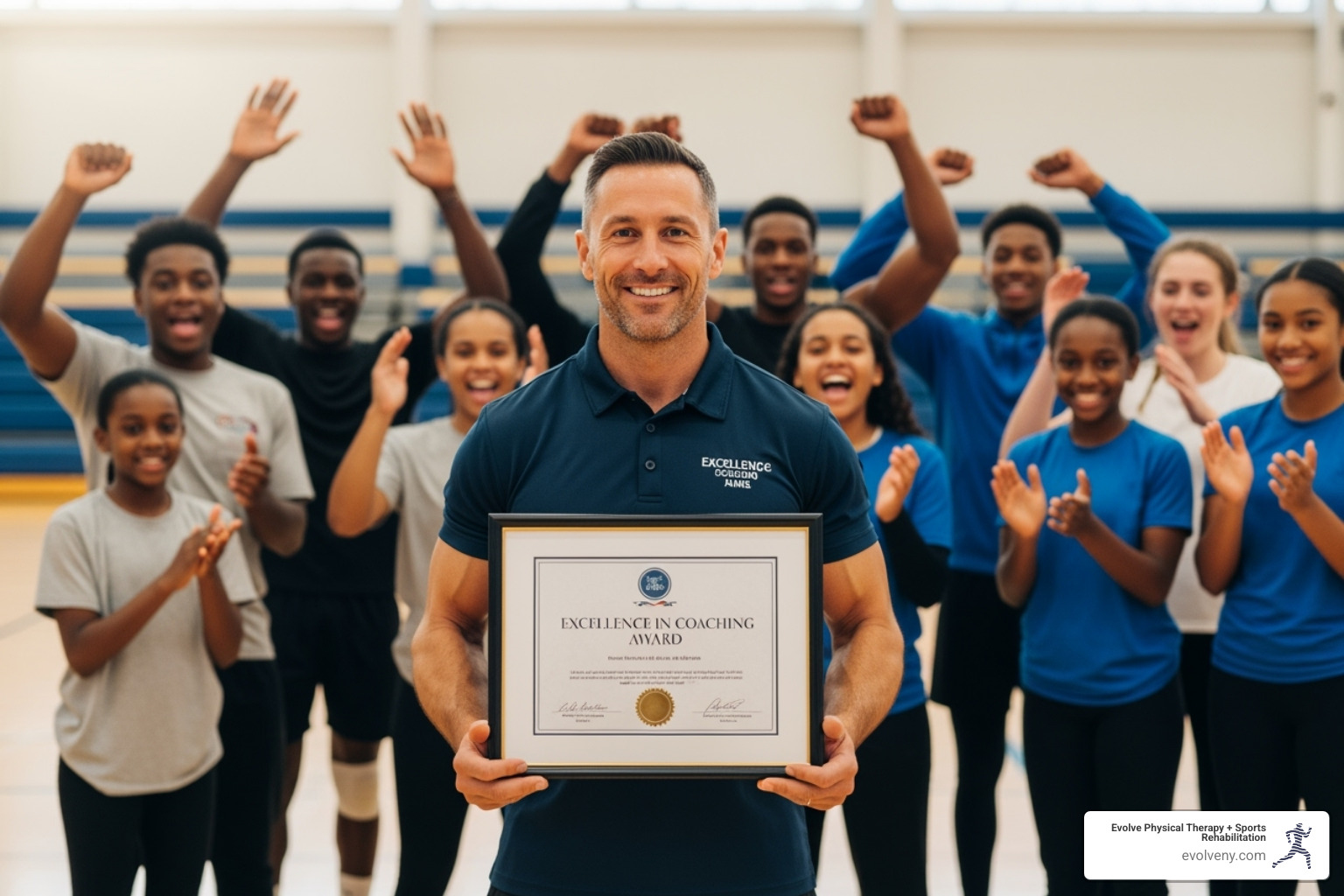Sports Coaching Certification: Your Ticket to the Big Leagues
Why Sports Coaching Certification Matters for Every Coach

Sports coaching certification is your gateway to becoming a trusted, effective coach. Whether you're volunteering with youth sports or aiming for elite levels, certification provides the standardized training, safety knowledge, and credibility you need to succeed.
Quick Answer: What You Need to Know About Sports Coaching Certification
- What it is: Standardized training programs (like Canada's NCCP) that teach coaching skills, athlete safety, and ethical practices across 65+ sports
- Why it matters: Ensures athlete safety, builds your credibility, and opens career opportunities
- How to get it: Register on platforms like 'The Locker,' complete online modules and workshops, pass evaluations
- Time required: Varies by sport and level—from a few weeks to several months
- Cost: Typically $135-$900+ depending on the certification level and bundled courses
- Maintenance: Requires ongoing professional development to keep credentials current
Since 1974, over 2 million coaches have completed training through programs like the National Coaching Certification Program (NCCP). These programs teach you how to create safe, inclusive environments where athletes thrive.
Certified coaches develop crucial leadership skills, communication abilities, and emotional intelligence. You'll learn to make ethical decisions, prevent injuries, and build a positive sport culture that keeps young people engaged.
Certification is about channeling your passion for sport into real, measurable impact. It gives you the tools to teach fundamental skills to children or develop high-performance strategies for elite competitors. The journey starts with understanding the pathways and requirements, and there's a clear roadmap for every coach.
As Lou Ezrick, founder of Evolve Physical Therapy, I've seen how proper training—whether in *sports coaching certification or injury prevention—transforms not just performance, but lives.* My experience rehabilitating athletes has shown me that the best coaches combine technical knowledge with a deep understanding of human movement, safety, and psychology.

Why Get a Sports Coaching Certification? The Winning Edge
Think about the coaches who made the biggest difference in your life. They knew how to communicate, inspire, and create a safe environment to grow. That's what sports coaching certification helps you become.

Improved credibility through certification shows athletes and parents that their trust is well-placed. It demonstrates your commitment to doing things right and meeting established standards.
The real game-changer is athlete safety. Certification teaches you injury prevention, emergency protocols, and how to spot signs of physical or psychological harm. This knowledge is essential for creating environments where athletes can push their limits safely.
You'll also develop stronger leadership skills, learning to motivate different personalities and manage team dynamics. Your impact extends into the community, as certified coaches often become role models who promote healthy, active lifestyles. The journey itself fuels personal growth, sharpening your communication, organization, and emotional intelligence.
For comprehensive resources, platforms like Human Kinetics Coach Education offer excellent materials to support your coaching journey.
Creating a Quality Sport Environment
A quality sport environment is about building a space where athletes thrive as whole people. Safe Sport practices form the foundation. You'll learn to protect athletes from abuse, harassment, and discrimination. Training covers your ethical responsibilities and prepares you to make sound decisions in difficult situations, often through modules like "Make Ethical Decisions."
Inclusivity is another cornerstone. You'll gain tools to welcome and support athletes from all backgrounds, abilities, and identities, and learn to recognize your own biases. Many programs now include focused content like anti-racism in coaching to address systemic issues.
The goal is a positive athlete experience where development and respect are priorities. When athletes feel safe and included, they're more likely to stick with sport for life. Certification gives you the knowledge to foster that growth in every athlete you work with.
Boosting Your Career and Personal Growth
Sports coaching certification is an investment in yourself. It opens doors to career opportunities, as many organizations require certification for higher-level or paid coaching roles.
The networking opportunities are also valuable, connecting you with other passionate coaches for advice and collaboration. Your communication skills will improve significantly as you learn to explain complex strategies and deliver motivating feedback.
Perhaps most importantly, certification builds your emotional intelligence. You'll develop a deeper understanding of how to manage different personalities and conflicts. All of this contributes to building confidence in your abilities. You'll know you're not just winging it—you've been trained in best practices.
The journey of professional development is ongoing, and certification provides a solid foundation to keep your knowledge current and your skills sharp.
Understanding Certification Frameworks: The NCCP Example
In Canada, the National Coaching Certification Program (NCCP) is the gold standard for sports coaching certification. Managed by the Coaching Association of Canada (CAC) since 1974, it provides standardized education across more than 65 sports. This consistency ensures coaches nationwide learn the same fundamental principles of athlete safety, skill development, and ethical coaching.
Over 2 million coaches have completed NCCP training, raising the quality of sport across the country. The program effectively combines multi-sport modules (foundational principles) with sport-specific technical training, giving you both universal coaching knowledge and the particular skills your sport demands.
Navigating the Certification Pathways
The NCCP recognizes that coaching contexts vary, so it offers three distinct streams.
The Community Sport stream is for coaches working with participants for fun and fitness, focusing on engagement and basic skills.
The Competition stream is for coaches whose athletes want to improve performance. It has multiple levels (Introduction, Development, Advanced) that build your skills for regional, provincial, or national competition.
The Instruction stream targets coaches teaching specific skills in a lesson-based format, like swimming or gymnastics instructors.
Within these streams are designations like Sport Coach or Performance Coach, each with specific training modules. Requirements vary significantly by sport, so a youth basketball coach follows a different path than an elite figure skating coach. To find your specific requirements, check your sport's specific pathway.
The Role of Sport Organizations
The NCCP works through a network of sport organizations.
National Sport Organizations (NSOs), like Athletics Canada or Basketball Canada, develop the sport-specific technical content for the NCCP framework. They ensure your certification is custom to the real demands of your sport.
Provincial and Territorial Sport Organizations (PSOs and TOs) are your direct point of contact. They deliver NCCP workshops and training in your region and can answer questions about local requirements.
Local clubs and associations implement these certified standards on the ground, where coaches work directly with athletes. This three-tier system creates a cohesive pathway from national standards to your local community. Contacting your NSO and PSO early in your journey can make the process much smoother.
Your Step-by-Step Guide to Becoming a Certified Coach
Ready to turn your coaching passion into certified expertise? Getting your sports coaching certification is a straightforward process. Here's a step-by-step guide to get you started.

Step 1: Choose Your Sport and Identify Requirements
First, pick your sport. Then, research the unique requirements set by the National Sport Organization (NSO) and the Provincial or Territorial Sport Organization (PSO or TSO). Requirements vary depending on whether you're coaching youth athletes or elite competitors, and whether you're a volunteer or a professional. Your sport's NSO or PSO website is the best source of information, and their staff can guide you.
Step 2: Register and Access Training via 'The Locker'
For Canadian coaches, 'The Locker' is your online portal for everything related to sports coaching certification. Creating an account on The Locker gives you access to the NCCP workshop calendar and a library of eLearning modules you can complete at your own pace.
The Locker automatically tracks your progress, storing your completed courses and coaching credits digitally. You can register for workshops and additional training directly on the platform, keeping everything organized in one place.
Step 3: Complete Modules and Evaluation for your sports coaching certification
Your certification journey will involve a mix of training types. You'll start with core multi-sport modules that cover foundational topics like coaching philosophy and safety. The Make Ethical Decisions (MED) module is mandatory for most certifications and teaches you how to handle complex ethical situations.
Next are the sport-specific technical modules, developed by your NSO. These dive deep into the unique skills, strategies, and rules of your chosen sport.
Many certifications also require a practical coaching assessment where you demonstrate your skills in action. This might involve being observed during a practice, submitting video recordings, or developing season plans. The evaluation process ensures you can apply what you've learned. Each module has its own assessment, from quizzes to practical demonstrations, so take your time to genuinely build the skills that will make you a better coach.
Advancing Your Skills and Maintaining Your Sports Coaching Certification
Getting your initial sports coaching certification is just the starting line. Sport science, athlete psychology, and training methods are always evolving, which is why maintaining your certification and advancing your skills is so important.

Most programs require you to accumulate Professional Development (PD) points over a set period to keep your certification current. You can earn these points by attending workshops, completing e-learning modules, participating in conferences, or mentoring other coaches. This system ensures your knowledge stays fresh.
For those wanting to go deeper, advanced diplomas offer comprehensive programs in sports psychology, nutrition, and injury prevention. For high-performance coaches, programs like the Sport Performance Coaching Certificate (SPCC) provide specialized training for developing elite athletes.
What are the costs associated with certification?
The financial investment for sports coaching certification varies by program, level, and sport. Module costs are the main expense, with individual NCCP modules ranging from about $135 to $205. Bundled prices for entire certification pathways, like the SPCC at around $900, can offer better value.
You should also consider NSO/PSO fees for registration or membership, as well as potential travel expenses for in-person workshops. Some coaches also invest in optional additional resources like textbooks. For the most accurate pricing, check the website of your specific NSO/PSO or 'The Locker' platform.
Resources for Continuous Learning
After achieving sports coaching certification, numerous resources can help you continue to grow. Webinars and e-learning offer flexible, self-paced learning on current topics in sports science and coaching. National coaching summits provide opportunities to learn from experts and network with peers. Mentorship programs pair new coaches with experienced ones for one-on-one guidance.
There are also excellent online resources, like Human Kinetics Coach Education. In the United States, programs like USA Basketball's Coach License program offer structured development. Embracing these resources helps you refine your craft and provide the best experience for your athletes.
Frequently Asked Questions about Sports Coaching
We hear the same questions again and again from coaches just starting their certification journey. Here are answers to some of the most common concerns about sports coaching certification.
How long does it take to get a coaching certification?
The timeline depends on the certification level and your sport. A basic community sport certification might take a few weeks to a couple of months, combining online modules with a weekend workshop.
Higher-level competition certifications are a longer journey, taking several months to a year or more due to numerous modules, technical training, and practical assessments.
The self-paced nature of online modules offers flexibility, but in-person workshops and evaluation scheduling also affect the overall timeline. Your best bet is to check the specific pathway details from your National Sport Organization for the most accurate estimate.
Are certifications from one country valid in another?
While coaching principles are universal, formal recognition of sports coaching certification varies by country. Canada's NCCP is highly respected, but moving to another country may require you to meet their national standards.
The transferability process might involve additional assessments or bridging courses. Before you move, contact the national sport governing body in the country where you plan to coach. They can clarify their requirements and any process for recognizing foreign credentials. Your existing knowledge and skills will still provide a strong foundation.
Do I need a First Aid certificate to be a coach?
Almost always, yes. A current First Aid certificate is either strongly recommended or mandatory for sports coaching certification, particularly when working with youth.
As a coach, you are responsible for your athletes' safety. Injuries happen, and knowing how to respond in the first few moments is critical. Many programs require "Sport First Aid" courses, which focus on injuries common in sports, like concussions, fractures, and heat exhaustion.
Check with your NSO and PSO for their specific First Aid and CPR requirements, including renewal frequency. This training gives you the confidence to handle emergencies and builds trust with parents. It's an investment that creates a safer environment for everyone.
Conclusion: Coach with Confidence and Lead the Way
Getting your sports coaching certification is about becoming the kind of coach who truly changes lives. It empowers you to lead with confidence.
We've covered how certification builds credibility, keeps athletes safe, and opens career doors. We've also explored the practical steps through programs like the NCCP and the resources available for continuous learning. This confidence comes from knowing you're prepared. You'll have the tools to create inclusive environments, make ethical decisions, and connect with athletes on a human level.
The impact of a certified coach extends far beyond the scoreboard, building character, resilience, and a lifelong love of sport. That's the real winning edge.
Of course, athletes can't perform at their best if they're sidelined by injury. At Evolve Physical Therapy, we've spent nearly two decades helping athletes recover and return to what they love. Our hands-on approach ensures athletes get back to peak performance. Learn how our sports rehab programs help athletes recover and perform at their peak.
Your journey toward sports coaching certification is an investment in yourself and your athletes. Take the first step, build your skills, and become the coach your athletes deserve. The field is waiting for you.

